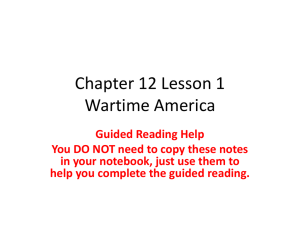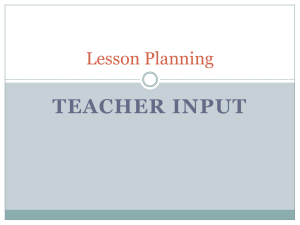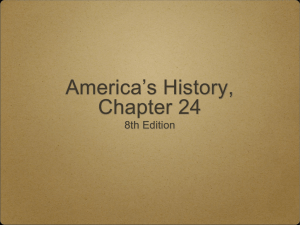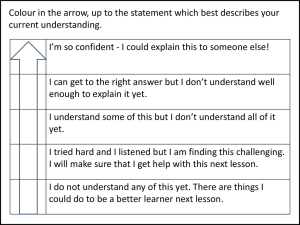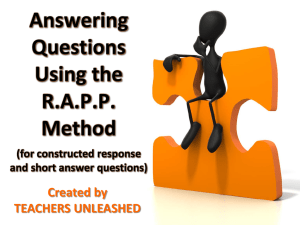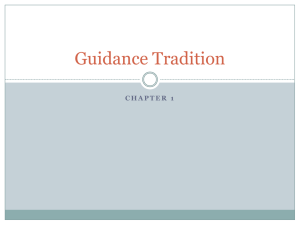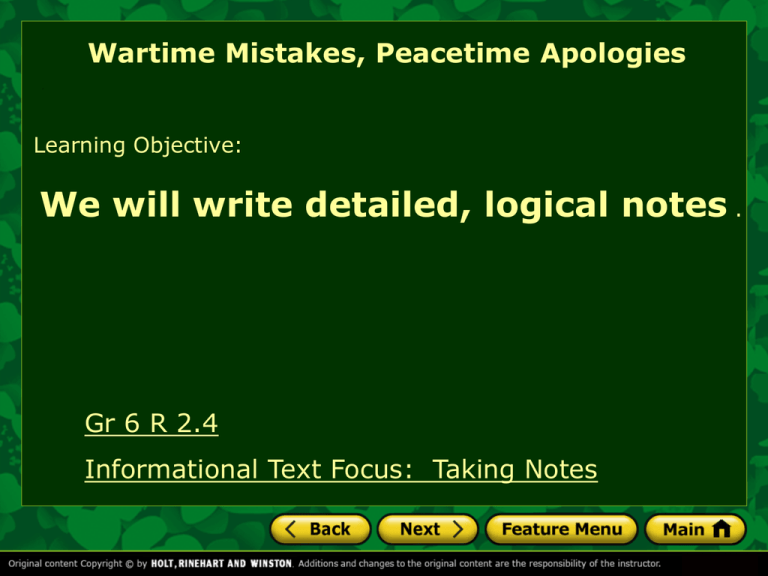
Wartime Mistakes, Peacetime Apologies
Learning Objective:
We will write detailed, logical notes .
Gr 6 R 2.4
Informational Text Focus: Taking Notes
Have you ever had trouble trying to remember something?
Sometimes, I know that I need to go to the grocery store,
but I’ve forgotten the things that I need.
So, now I take a list with me.
How do you remember the things you
need?
-information for a test?
-materials for activities like
sports, homework, or music?
Taking notes as you read helps you keep track
of the main ideas in whatever you’re reading.
APK
Wartime Mistakes, Peacetime Apologies
Informational Text Focus: Taking Notes
Notes help you understand and remember
information.
Notes contain the main idea of the selection
Notes may be paraphrased or direct
quotations
Notes must have some details that answer the
questions:
concept
Example:
Madera Unified School District
25 schools
16 Elementary Schools
3 Middle Schools
Non Example
Madera Unified School District
Lots of buildings
Elementary, middle and high schools
Serves kids of all ages
Wartime Mistakes, Peacetime Apologies
Informational Text Focus: Taking Notes
Remember that the purpose of your notes is to list
important details. Be sure to
put facts and details in your own words
PEARL HARBOR
Sunday morning, Dec. 7, 1941
put quotation marks around the author’s words
“shall live in infamy”
Wartime Mistakes, Peacetime Apologies
Informational Text Focus: Taking Notes
Your notecards will look like this:
Main Idea
•supporting detail
•supporting detail
•supporting detail
What lists important details and helps you understand
and remember information?
What kinds of things should you include in your notes?
What questions are answered in notes?
Which of the following could belong in your notes?
A. The birth date of an historical person
B. The favorite ice-cream flavor of an historical person.
Why?
RAJ
Why is it important to know how to take notes?
Organizes information
Shortens what you write
Helps your brain to remember important facts
Is there another reason you can think of?
importance
Wartime Mistakes, Peacetime Apologies
Informational Text Focus: Taking Notes
Into Action
To take logical, detailed notes, follow these steps:
Read through the selection once to find the
main ideas, or most important points.
Make one card for each main idea.
Write key details about each main idea.
skill
Wartime Mistakes, Peacetime Apologies
Informational Text Focus: Taking Notes
Listen to this opening passage from “Wartime
Mistakes, Peacetime Apologies.”
• What is the main idea of this passage?
Yoshiko Imamoto—imprisoned
but had done nothing wrong
• What is one detail you could write on a
notecard?
was a teacher
"Wartime Mistakes, Peacetime Apologies" by Nancy Day from Cobblestone: Japanese Americans, April 1996. Copyright © 1996 by Cobblestone
Publishing, 30 Grove Street, Suite C, Peterborough, NH 03458. All rights reserved. Reproduced by permission of Carus Publishing Company.
Guided- I do
Wartime Mistakes, Peacetime Apologies
Informational Text Focus: Taking Notes
What other details might you add to your
notecard list?
On March 13, 1942, Yoshiko Imamoto opened her
door to face three FBI agents. They let her pack a
nightgown and a Bible, then took her to jail while
they “checked into a few things.” Imamoto had lived
in America for twenty-four years. She was a teacher
and had done nothing wrong.
"Wartime Mistakes, Peacetime Apologies" by Nancy Day from Cobblestone: Japanese Americans, April 1996. Copyright © 1996 by Cobblestone Publishing, 30
Grove Street, Suite C, Peterborough, NH 03458. All rights reserved. Reproduced by permission of Carus Publishing Company.
I do
Wartime Mistakes, Peacetime Apologies
Informational Text Focus: Taking Notes
Your first notecard might look like this.
Yoshiko Imamoto
•arrested by FBI—1942—no warning
.
•24-year U.S. resident
•law-abiding teacher
.
[End of Section]
What other details can we take notes on from this paragraph?
When Japan bombed Pearl Harbor on December 7,
1941, Japanese Americans were caught in the
middle. They felt like Americans but looked like the
enemy. Neighbors and co-workers eyed them
suspiciously.
"Wartime Mistakes, Peacetime Apologies" by Nancy Day from Cobblestone: Japanese Americans, April 1996. Copyright © 1996 by Cobblestone Publishing, 30
Grove Street, Suite C, Peterborough, NH 03458. All rights reserved. Reproduced by permission of Carus Publishing Company.
Guided Practice We do
But, a month earlier, President Franklin D. Roosevelt
had issued Executive Order 9066, which drastically
changed the lives of Imamoto and more than
120,000 other people of Japanese ancestry living in
the United States.
Then Executive Order 9066, issued on February 19,
1942, authorized the exclusion of, “any or all
persons” from any area the military chose. The
word “Japanese” was never used, but the order was
designed to allow the military to force Japanese
Americans living near the coast to leave their homes
for the duration of the war. Some were allowed to
move inland, but most, like Yoshiko Imamoto, were
herded into prisonlike camps.
"Wartime Mistakes, Peacetime Apologies" by Nancy Day from Cobblestone: Japanese Americans, April 1996. Copyright © 1996 by Cobblestone Publishing, 30
Grove Street, Suite C, Peterborough, NH 03458. All rights reserved. Reproduced by permission of Carus Publishing Company.
Guided Practice You do
What is one way to remember
and organize important information?
What did you learn today about taking notes?
Closure
Independent Practice
Pages 69 & 71 finish taking notes on these sections
Using the note card headings provided.

